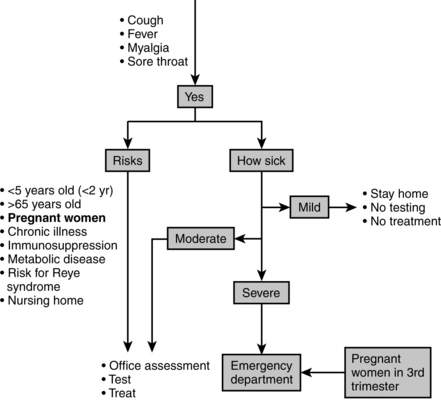Chapter 39 Influenza
4 Who is at risk for more severe or complicated influenza?
 Chronic pulmonary (including asthma), cardiovascular (except hypertension), renal, hepatic, neurologic, hematologic, or metabolic disorders (including diabetes mellitus)
Chronic pulmonary (including asthma), cardiovascular (except hypertension), renal, hepatic, neurologic, hematologic, or metabolic disorders (including diabetes mellitus)
 Immunosuppression caused by medications, organ transplantation, malignancy, or HIV
Immunosuppression caused by medications, organ transplantation, malignancy, or HIV
 Pregnancy during the influenza season
Pregnancy during the influenza season
 Aged 6 months to 18 years and receiving long-term aspirin therapy (Reye syndrome)
Aged 6 months to 18 years and receiving long-term aspirin therapy (Reye syndrome)
 Residents of nursing homes and other long-term–care facilities
Residents of nursing homes and other long-term–care facilities
 American Indians and Alaska Natives
American Indians and Alaska Natives
8 What is the approach to the patient with an ILI?
Those with mild symptoms (no shortness of breath and able to maintain hydration) and no risks for complications do not need further testing and can be treated symptomatically. Those with moderate symptoms (some shortness of breath, difficulty maintaining hydration, signs and symptoms of pneumonia) should be tested and treated with antiviral medications. Those with severe symptoms (respiratory distress, altered mental status) need immediate assessment in the emergency department. Pregnant women with influenza, especially those in the third trimester, have a high rate of complications and should be urgently assessed in the emergency department also. See Figure 39-1.
< div class='tao-gold-member'>
Stay updated, free articles. Join our Telegram channel

Full access? Get Clinical Tree






